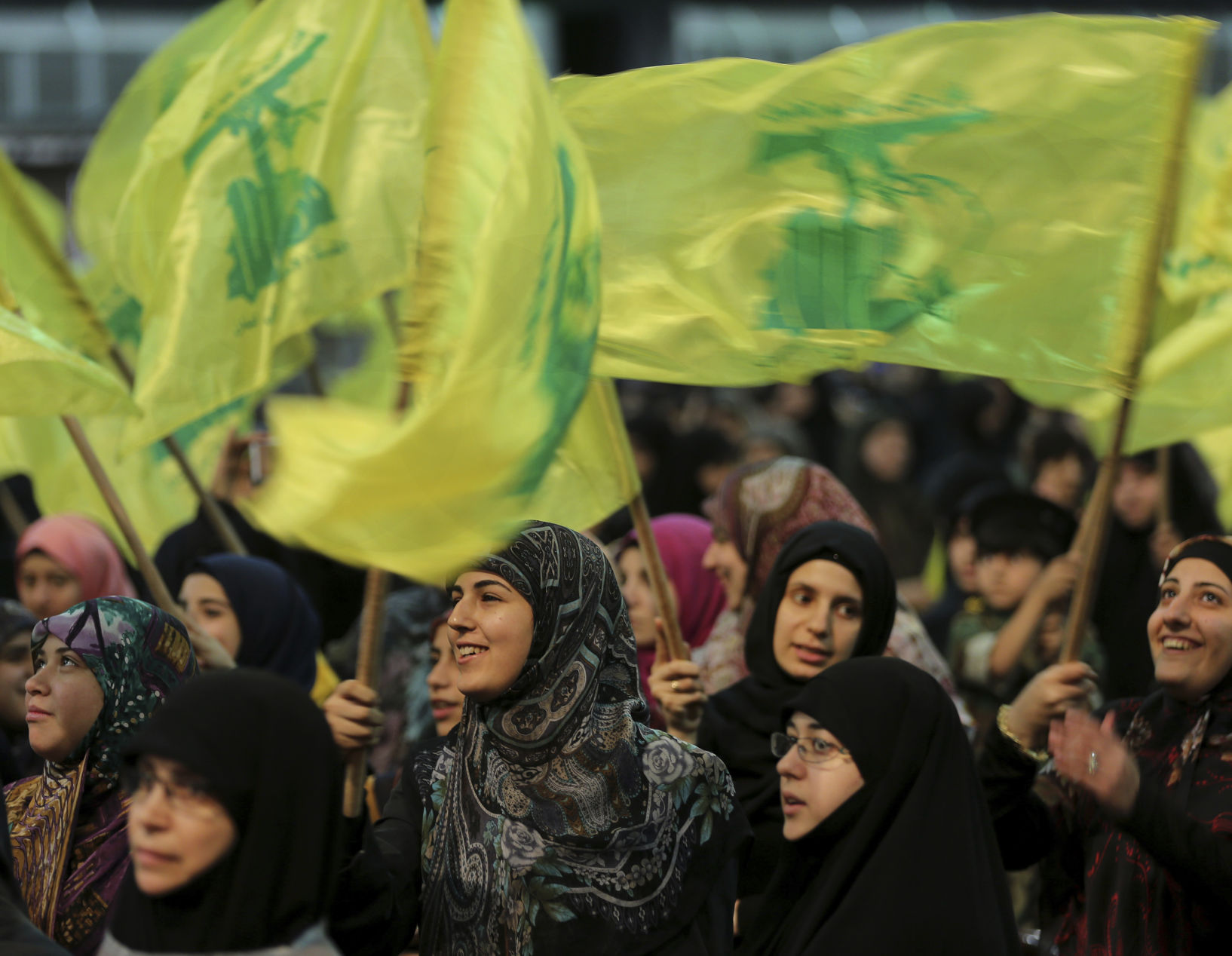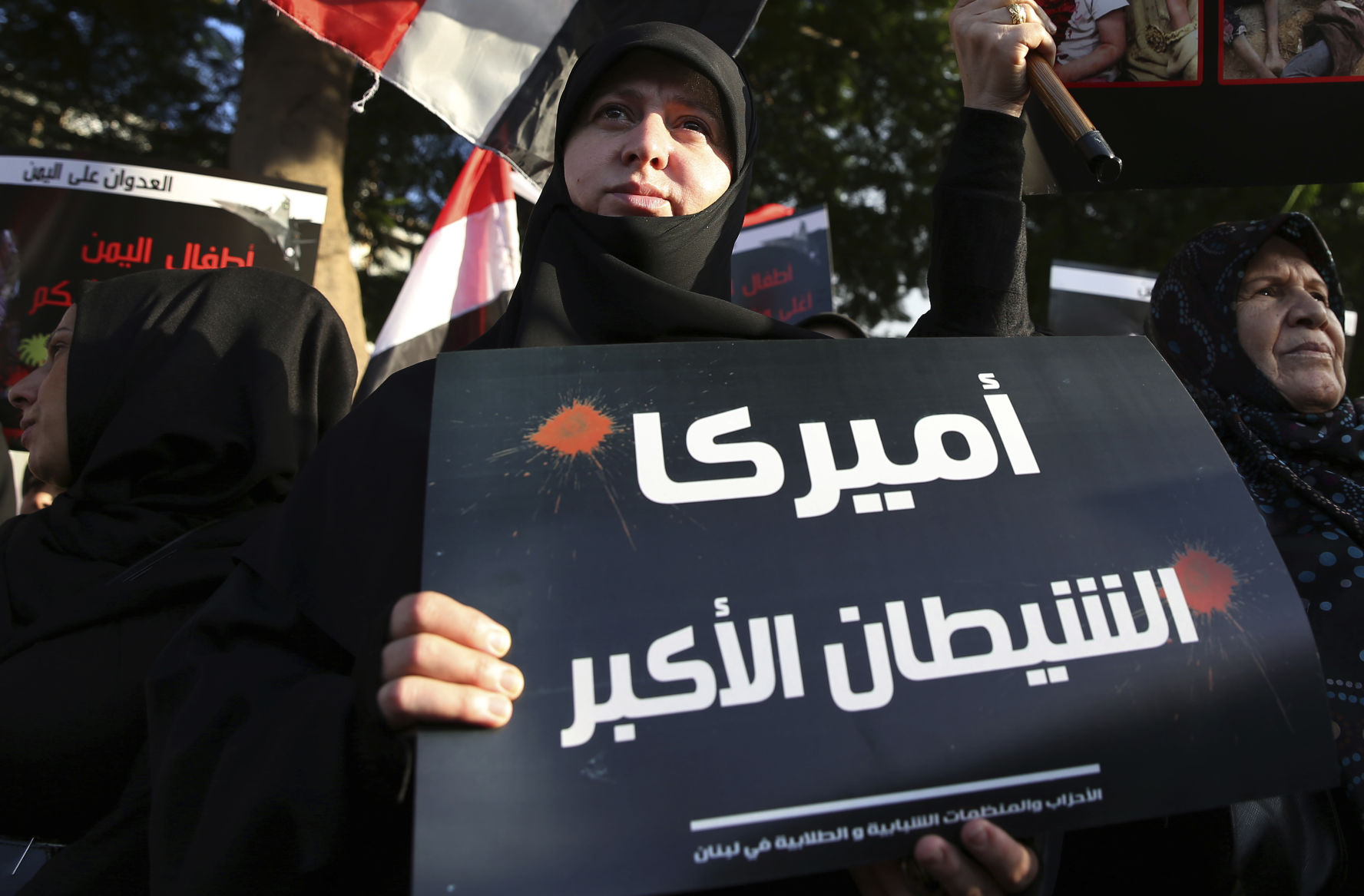BEIRUT (AP) — Hezbollah on Wednesday dismissed a multimillion dollar reward offered by the Trump administration in return for information on two of its key operatives, describing it as an ongoing attempt to “demonize” the group. The tougher U.S. measures,
BEIRUT (AP) — Hezbollah on Wednesday dismissed a multimillion dollar reward offered by the Trump administration in return for information on two of its key operatives, describing it as an ongoing attempt to “demonize” the group.
The tougher U.S. measures, including a plan to further tighten sanctions imposed on Hezbollah, are part of a larger effort to ramp up pressure on Iran, which has expanded its influence across the region through the Lebanese militant group and other proxies.
U.S. and Israeli officials have expressed mounting concern about the expanding footprint of Hezbollah and other Iranian-backed forces in war-torn Syria, and are looking for ways to pressure Tehran. President Donald Trump is threatening to scuttle the landmark 2015 nuclear deal with Tehran, a process he could initiate in the coming days.
“The U.S. and Israel are concerned about Iran consolidating its position in Syria. With no reliable sign that either party is willing to do anything decisive about that, they’re left with options such as sanctions, arrest warrants and the like,” said Faysal Itani, a senior fellow with the Atlantic Council’s Rafik Hariri Center for the Middle East.
A Hezbollah official told The Associated Press in Beirut Wednesday that the U.S. measures will not affect the group. He was reacting to the State Department’s announcement Tuesday of a total of $12 million for information leading to the location, arrest or conviction of two senior commanders.
“It is part of the continuous efforts to demonize Hezbollah. They are false accusations that will not have any effect on the operational activities of Hezbollah,” the official said, speaking on condition of anonymity in line with party regulations.
The rewards are the first offered by the United States for Hezbollah leaders in a decade, and come amid heightened U.S.-Iran tensions following Trump’s election.
Trump has called the nuclear deal one of America’s “worst and most one-sided transactions” ever. He is expected to decline this week to certify Iran’s compliance and refer the matter to Congress. He also is expected to target Iran’s paramilitary Revolutionary Guard with new sanctions.
On Wednesday, Iranian Foreign Minister Mohammad Javad Zarif warned of a tough response if Trump presses ahead with his threats to scuttle the nuclear deal, saying Iran “will never renegotiate” the agreement brokered under the Obama administration.
The State Department on Tuesday offered up to $7 million for information on Talal Hamiyah, who it claims leads Hezbollah’s “international terrorism branch.”
Another $5 million is being offered for information on Fuad Shukr, a member of Hezbollah who runs the group’s military forces in southern Lebanon, where the group is based. The State Department said he played a key role in Hezbollah’s recent military operations in Syria.
The Hezbollah official dismissed the accusations, saying the United States is “the last state” to designate people on terror lists, accusing it of supporting terrorist groups and states “that have a long history in financing and supporting terrorism.”
Hezbollah has sent thousands of its fighters to shore up President Bashar Assad’s forces in Syria’s ongoing civil war and also has been fighting the Islamic State group both inside Syria and along the Lebanese-Syrian border.
The Lebanese state is coming under increased pressure to rein in the group. Ambassador Nathan Sales, the U.S. State Department Counter-Terrorism Coordinator, said Tuesday that the Lebanese government “needs to recognize (Hezbollah) as a terrorist organization.”
At a congressional hearing on Iran Wednesday morning, Rep. Ed Royce, the chairman of the House Foreign Affairs Committee, continued the Republicans’ tough rhetoric against Hezbollah, describing its current capabilities and arsenal as a “powder keg.”
Israeli Defense Minister Avigdor Lieberman went a step further, saying Tuesday that Hezbollah controls Lebanon’s army. The U.S. has given the Lebanese military more than $1 billion in security assistance over the past decade, viewing it as a counterbalance to Hezbollah and a partner in fighting al-Qaida, Islamic State and other extremists.
The Hezbollah official said the U.S. measures, including sanctions targeting Hezbollah figures and institutions, would have a limited effect on the group while harming the Lebanese economy.
Itani, the analyst, also said it is highly unlikely the sanctions would affect Hezbollah.
Hezbollah “has been a US-designated terrorist organization for a long time, and its people are smart enough to see this for what it likely is: a ‘Plan B’ for a power that is not willing to take on the risks of Plan A, which would be direct confrontation,” he said.
———
Associated Press writer Deb Riechmann in Washington contributed to this report.




